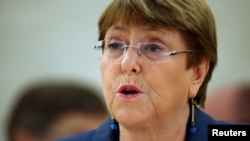UN High Commissioner for Human Rights Michele Bachelet warned the coronavirus pandemic is likely to widen existing inequalities around the world if left unchecked, with the poor, the disabled, the homeless, minorities, women and elderly among others most at risk. At a virtual meeting, the human rights chief also had stern criticism for governments that she said are using health emergency measures to justify repression and expand their powers.
UN High Commissioner for Human Rights Michele Bachelet said civil and political rights are being threatened by governments that are abusing the emergency measures they are taking to respond to this public health crisis. She said an emergency situation is not a blank check to disregard human rights obligations.
“I am profoundly concerned by certain countries’ adoption of emergency powers that are unlimited and not subject to review," Bachelet said. "In a few cases, the epidemic is being used to justify repressive changes to regular legislation, which will remain in force long after the emergency is over. I am also concerned by steps taken to impose restrictions on media freedom and freedom of expression.”
Bachelet said journalists, health workers, state officials, and ordinary people are being penalized for criticizing governments for doing a poor job in fighting the coronavirus. She said criticism is not a crime. She urged governments to increase access to accurate information, noting transparency can be lifesaving in a health crisis.
The High Commissioner said she is very concerned about the rise in hate speech, discrimination, and attacks against people blamed for the disease.
“When an existential threat faces all of us, there is no place for nationalism or scapegoating—including of migrants and minority communities," she said. "There have been growing, and unacceptable, physical and verbal attacks on people of East Asian origin, and members of other minorities, and action should be taken to combat this.”
Bachelet said lockdowns cannot continue forever, and governments must be prepared with exit strategies that ensure societies and people recover in ways that safeguard both their economic and human rights.
The UN High Commissioner for Human Rights warned the pandemic is worsening inequality in the world, hitting women, the poor, the disabled and others who are already vulnerable especially hard.
The U.N. rights chief warned the most vulnerable members of society are at greatest threat of falling ill and dying because they lack access to health care.
At the same time, Michele Bachelet said they will suffer most from the extensive economic and social shocks created by the pandemic.




